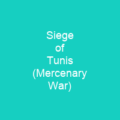The Mercenary War: A Truceless Conflict
Imagine a world where peace is but a fleeting moment between battles. That’s what the Mercenary War, also known as the Truceless War, was like for Carthage in ancient times. This conflict, which lasted from 241 to late 238 or early 237 BC, was a brutal and relentless struggle that reshaped the political landscape of North Africa.
The Spark: A Dispute Over Wages
It all began with a simple yet profound issue—wages. In 20,000 foreign soldiers, Carthage had invested heavily in its military might during the First Punic War (264-241 BC). These troops fought valiantly for Sicily but were left unpaid after the war’s end. The army erupted into mutiny under the leadership of Spendius and Matho, joined by 70,000 Africans from oppressed territories. Can you imagine the frustration that led to such a massive uprising?
Warfare and Leadership
The conflict quickly escalated, with rebels torturing and killing Carthaginian prisoners. The war became a brutal affair, where every act of violence seemed to fuel more intense battles. Hamilcar Barca, initially given joint command, later took supreme control and led successful campaigns against the rebels.
The Turning Point: Hamilcar’s Leadership
Under Hamilcar’s leadership, Carthage began to turn the tide. He used a stratagem to defeat Spendius and his army of 25,000 men. This victory was crucial as it allowed Hamilcar to force many rebellious towns and cities back into allegiance with varying degrees of diplomacy and force.
The Truceless War
Despite these victories, the conflict continued without respite. The term “Truceless War” aptly describes the relentless nature of this struggle. Hamilcar was elected as supreme commander by his army and defeated Spendius’ forces at the Saw. He then laid siege to Tunis but abandoned it after suffering casualties.
Reconciliation Efforts
The Senate encouraged reconciliation between Hanno and Hamilcar, leading them to march on Leptis Parva and defeat Matho’s rebels in open battle. Most of Sardinia was surrendered to Carthage, except for Utica and Hippo.
Consequences and Aftermath
The Romans eventually agreed to seize both Sardinia and Corsica, fueling resentment in Carthage. Polybius saw this as the cause of war between them breaking out again nineteen years later. The victory led to Hamilcar Barca’s increased prestige and power, leading him to expand Carthaginian holdings in southern Iberia.
Historical Sources
Historical sources for the Mercenary War include Polybius’s The Histories, based on Greek and Latin sources, as well as inscriptions, coins, and archaeological evidence. It was the longest continuous conflict and the greatest naval war of antiquity.
Conclusion: A Truceless Conflict Reshaping History
The Mercenary War was more than just a series of battles; it was a turning point in Carthaginian history, reshaping its domestic fortunes and military orientation. This truceless conflict not only reversed the political landscape but also set the stage for future conflicts, including the Second Punic War.

You want to know more about Mercenary War?
This page is based on the article Mercenary War published in Wikipedia (retrieved on November 28, 2024) and was automatically summarized using artificial intelligence.







